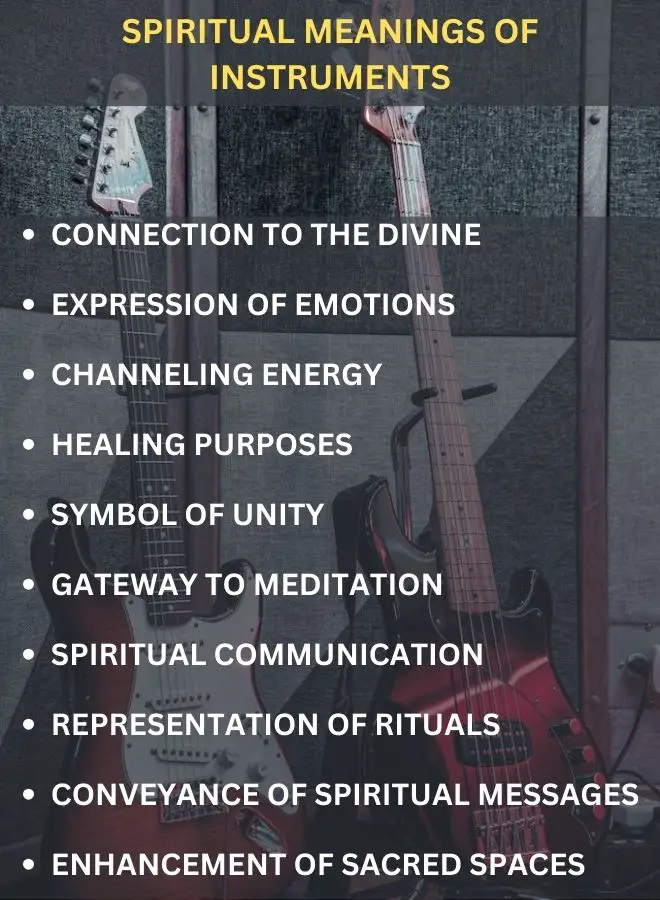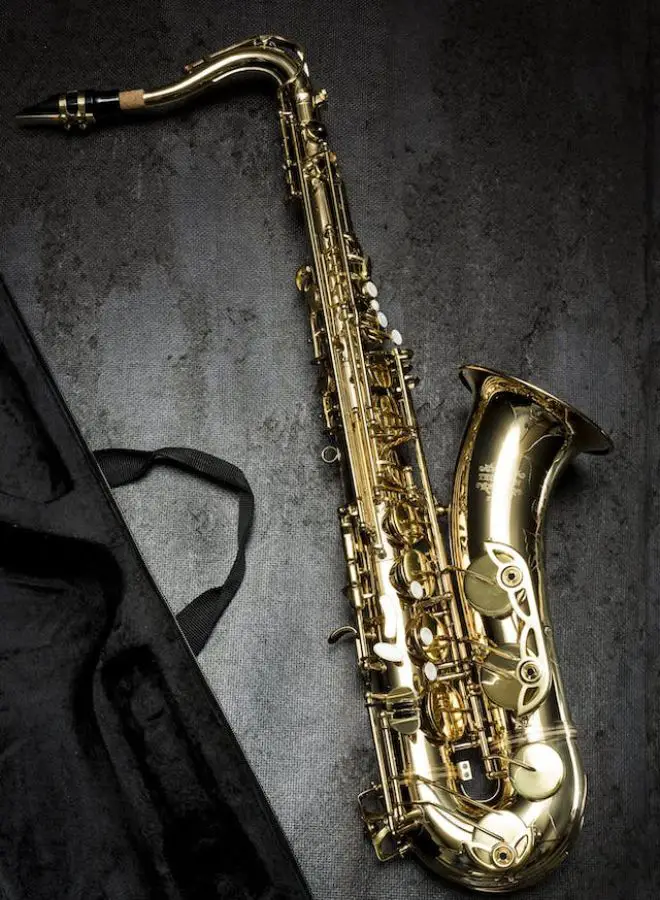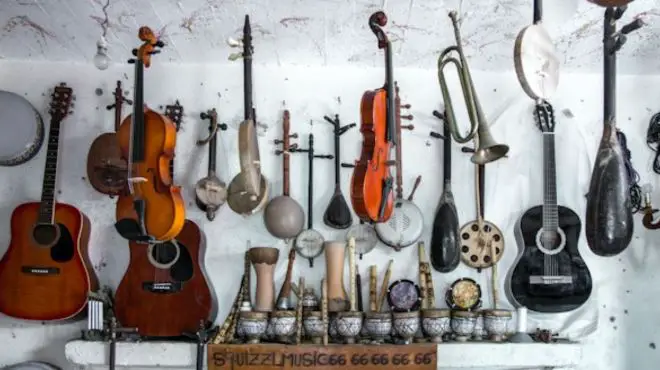Instruments serve as conduits for spiritual connection, expression, and healing. They channel energy, unite people, and facilitate meditation. Instruments convey profound messages, enhance rituals, and sanctify spaces, guiding us toward spiritual enlightenment.
In a world filled with hustle and bustle, where stress seems to be the order of the day, many of us seek solace in the soothing melodies of music. But have you ever stopped to ponder the deeper significance behind the instruments that produce these enchanting tunes? Beyond their melodies lies a profound spiritual realm that resonates with the essence of our being.
Let’s embark on a journey to explore the spiritual meaning of instruments, uncovering their mysteries and their power to uplift our souls.
Spiritual Meanings of Instruments
Instruments are more than just tools for creating music; they serve as conduits for spiritual expression and connection. Each instrument carries its own unique energy, imbued with symbolism and significance that transcend the physical realm. Let’s delve into the most common spiritual meanings attributed to instruments:

1. Connection to the Divine
Instruments have long been revered as vessels through which humans can connect with the divine. Whether through prayerful hymns or meditative melodies, music has the power to transcend earthly boundaries and transport us to higher realms of consciousness.
The harmonious vibrations of instruments resonate with our innermost being, facilitating a profound sense of connection with the spiritual universe.
2. Expression of Emotions
Music has the innate ability to evoke a wide range of emotions, from joy and love to sorrow and longing. Instruments serve as tools for expressing these emotions in a raw and unfiltered manner, allowing us to release pent-up feelings and find solace in the melodies.
Whether through the melancholic strains of a violin or the rhythmic beats of a drum, instruments provide an outlet for emotional expression and catharsis.
3. Channeling Energy
Instruments are not only receivers of energy but also transmitters of it. The vibrations produced by instruments have the power to channel and manipulate energy, creating a harmonious flow that resonates with the universe.
Whether used in healing rituals or spiritual ceremonies, instruments harness the energy of the cosmos to bring about positive transformation and spiritual awakening.
4. Healing Purposes
The healing power of music is well-documented, with instruments playing a central role in many therapeutic practices. From the soothing tones of a flute to the grounding rhythms of a drum, instruments have the ability to alleviate stress, reduce anxiety, and promote overall well-being.
Through the vibrational frequencies they emit, instruments can harmonize the body, mind, and spirit, restoring balance and vitality to those in need.
5. Symbol of Unity
Instruments have a remarkable ability to bring people together, transcending cultural, linguistic, and social barriers. Whether in the form of communal drum circles or collaborative musical performances, instruments serve as symbols of unity and harmony.
Through the act of making music together, individuals are able to forge deep connections with one another, fostering a sense of belonging and interconnectedness.
6. Gateway to Meditation
Meditation is a powerful tool for spiritual growth and self-discovery, and instruments can serve as potent aids in this practice. The rhythmic sounds of instruments can act as focal points for meditation, helping to quiet the mind and deepen one’s awareness of the present moment.
Whether through the gentle plucking of a harp or the resonant hum of a singing bowl, instruments can guide us on a journey inward, towards inner peace and enlightenment.
7. Spiritual Communication
In many spiritual traditions, instruments are used as vehicles for communicating with higher beings and spiritual guides. Whether in the form of devotional chants or sacred songs, instruments serve as conduits for divine messages and revelations.
Through the act of making music, practitioners can open themselves up to spiritual guidance and inspiration, receiving insights and wisdom from the unseen realms.
8. Representation of Rituals
Instruments play a central role in religious and spiritual rituals around the world, serving as symbols of devotion and reverence. Whether in the form of ceremonial drums or ritualistic chants, instruments are used to invoke the presence of the divine and facilitate communion with the spiritual realm.
Through the rhythmic beats and melodic strains of instruments, practitioners can engage in sacred rites and ceremonies that honor their spiritual beliefs and traditions.
9. Conveyance of Spiritual Messages
Instruments have the power to convey profound spiritual messages and teachings, transcending language and cultural barriers. Whether through the lyrics of a song or the melodies of an instrumental piece, instruments can impart timeless wisdom and insight to listeners.
Through the universal language of music, spiritual truths and principles can be communicated to individuals of all backgrounds and beliefs, inspiring them to embark on their own journey of spiritual growth and enlightenment.
10. Enhancement of Sacred Spaces
Instruments have the ability to transform ordinary spaces into sacred sanctuaries, imbuing them with an atmosphere of reverence and awe. Whether in the form of temple bells or sacred gongs, instruments are used to purify and sanctify sacred spaces, inviting in divine energies and blessings.
Through the resonant vibrations they emit, instruments can elevate the spiritual vibrations of a space, creating an environment conducive to prayer, meditation, and spiritual contemplation.
Variations and Spiritual Meanings of Instruments
Now that we’ve explored the overarching spiritual meanings of instruments, let’s take a closer look at some specific variations and their unique significance:
String Instruments
Guitar
The guitar is often associated with passion, creativity, and emotional expression. Its versatile nature allows players to convey a wide range of emotions through its melodic tones and expressive techniques.
Violin
The violin is often regarded as the voice of the soul, capable of conveying profound emotions and stirring the depths of the human spirit. Its haunting melodies can evoke feelings of love, longing, and transcendence.
Harp
The harp is often associated with celestial realms and divine grace. Its ethereal tones have the power to uplift and inspire, transporting listeners to higher states of consciousness and spiritual awareness.
Wind Instruments
Flute
The flute is often associated with purity, innocence, and spiritual enlightenment. Its delicate melodies can evoke feelings of serenity, tranquility, and inner peace.
Panpipe
The panpipe is often associated with nature, fertility, and the cycles of life. Its earthy tones can evoke feelings of connection to the natural world and the rhythms of the universe.
Didgeridoo
The didgeridoo is often associated with ancient wisdom, ancestral spirits, and the dreamtime. Its primal tones can evoke feelings of primal energy, connection to the earth, and spiritual awakening.
Percussion Instruments
Drum
The drum is often associated with primal energy, rhythm, and heartbeat. Its pulsating rhythms can evoke feelings of vitality, power, and connection to the heartbeat of the earth.
Tibetan Singing Bowl
The Tibetan singing bowl is often associated with healing, balance, and inner harmony. Its resonant tones can evoke feelings of deep relaxation, meditation, and spiritual renewal.
Handpan
The handpan is often associated with serenity, contemplation, and inner reflection. Its melodic tones can evoke feelings of peace, tranquility, and spiritual connection.
Biblical and Hinduism Meanings of Instruments

Biblical
The Bible is replete with references to music and instruments, highlighting their spiritual significance and importance in religious worship. Let’s explore some of the biblical meanings attributed to instruments:
Psalms and Musical Instruments
In the book of Psalms, King David is credited with composing numerous psalms that extol the virtues of music and musical instruments. Instruments such as the harp, lyre, and trumpet are mentioned frequently throughout the Psalms, serving as symbols of praise and worship to the Lord.
David and the Harp
One of the most famous stories involving music in the Bible is the tale of David and the harp. According to biblical tradition, David was known for his skillful playing of the harp, which he used to soothe the troubled spirit of King Saul. The harp is often associated with divine inspiration and spiritual healing in biblical lore.
Trumpets in Religious Ceremonies
In the Old Testament, trumpets are often used in religious ceremonies and rituals as instruments of proclamation and celebration. The sound of the trumpet is associated with the voice of God, signaling divine intervention and the presence of the divine. Trumpets are used to herald important events and convey spiritual messages to the people of Israel.
Hinduism
In Hinduism, music plays a central role in religious worship and spiritual practice, with instruments serving as sacred tools for connecting with the divine. Let’s explore the spiritual significance of instruments in Hinduism.
Importance of Music in Hindu Worship
In Hindu worship, music is regarded as a form of divine expression, with instruments used to invoke the presence of the gods and goddesses. Devotional songs, known as bhajans, are sung in praise of the divine, accompanied by instruments such as the harmonium, tabla, and sitar.
Spiritual Significance of Instruments in Bhakti Yoga
Bhakti yoga, or the path of devotion, is one of the major spiritual paths in Hinduism, emphasizing love, devotion, and surrender to the divine. Music and instruments play a central role in bhakti yoga, serving as vehicles for expressing love and devotion to the gods and goddesses.
Through the chanting of mantras and the singing of devotional songs, practitioners can deepen their connection with the divine and experience spiritual union.
Symbolism of Instruments in Hindu Mythology
In Hindu mythology, many gods and goddesses are depicted holding musical instruments, symbolizing their role as patrons of the arts and embodiments of divine grace.
For example, Lord Krishna is often depicted playing the flute, symbolizing his ability to enchant and uplift the souls of his devotees. The sound of his flute is said to represent the divine call that draws all beings back to their spiritual source.
Cultural Significance of Instruments
In addition to their spiritual significance, instruments also hold cultural importance in various traditions and societies around the world. Let’s explore the cultural significance of instruments in different contexts:
Indigenous Cultures and Instruments
In indigenous cultures around the world, instruments are used in traditional ceremonies and rituals to connect with the natural world and the spirits of the ancestors. From the rhythmic drumming of Native American powwows to the haunting melodies of Aboriginal didgeridoos, instruments play a vital role in preserving cultural heritage and fostering a sense of community and identity.
Traditional Folk Music and Instruments
In many cultures, traditional folk music is passed down from generation to generation, accompanied by a rich array of instruments that reflect the unique cultural identity of each region.
From the lively accordion tunes of Cajun music to the soulful melodies of Irish fiddles, instruments are used to celebrate cultural traditions and express the joys and sorrows of everyday life.
Role of Instruments in Rituals and Ceremonies
In addition to their role in religious rituals, instruments are also used in secular ceremonies and celebrations to mark important milestones and transitions in life.
Whether in the form of wedding processions, funeral dirges, or harvest festivals, instruments serve as symbols of communal unity and cultural pride, bringing people together in times of joy and sorrow.
Improving Spiritual Life through Instruments
Now that we’ve explored the spiritual meanings of instruments and their cultural significance, how can we harness their power to enhance our spiritual lives? Here are some practical tips for incorporating instruments into your spiritual practice:
Mindful Playing and Listening
Whether you’re a musician or simply a lover of music, approaching instruments with mindfulness and intention can deepen your spiritual connection to the music. Take the time to listen deeply to the sounds of instruments, allowing yourself to be fully present in the moment and attuned to the vibrations they emit.
Incorporating Instruments into Meditation Practices
Incorporating instruments into your meditation practice can enhance your spiritual experience and deepen your sense of inner peace and tranquility. Experiment with using instruments such as singing bowls, chimes, or drums as focal points for meditation, allowing their resonant vibrations to guide you into a state of deep relaxation and mindfulness.
Joining Spiritual Music Communities
Connecting with like-minded individuals who share your passion for spiritual music can enrich your spiritual journey and provide a supportive community for exploration and growth. Consider joining a spiritual music group or attending concerts and gatherings where instruments are used to facilitate spiritual healing and transformation.
Using Instruments for Personal Reflection
Instruments can serve as powerful tools for self-reflection and introspection, allowing you to explore your innermost thoughts and emotions through music. Take the time to experiment with different instruments and musical styles, allowing yourself to express your innermost thoughts and feelings in a creative and cathartic manner.
Exploring Different Cultural Traditions
Broadening your horizons and exploring different cultural traditions can expand your understanding of the spiritual significance of instruments and deepen your appreciation for the diversity of musical expression around the world.
Take the time to learn about the music and instruments of different cultures, attending concerts, festivals, and workshops to immerse yourself in the rich tapestry of global music.
Conclusion
In conclusion, the spiritual meaning of instruments transcends the boundaries of time, culture, and belief, resonating with the essence of our being and connecting us to the divine. Whether through their melodies, rhythms, or vibrations, instruments have the power to uplift our souls, awaken our spirits, and elevate our consciousness to higher realms of existence.
By embracing the spiritual significance of instruments and incorporating them into our lives with mindfulness and intention, we can harmonize body, mind, and spirit, and embark on a journey of spiritual growth and enlightenment. So, let the music play on, and may the spiritual vibrations of instruments guide you on your path to inner peace, joy, and fulfillment.
Let the melodies of instruments be your guide as you embark on a journey of spiritual discovery and self-transformation. For in the music of the soul, lies the key to unlocking the mysteries of the universe.








